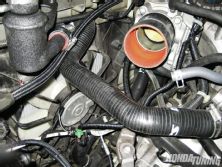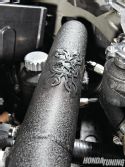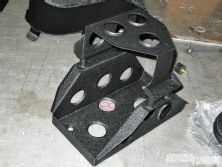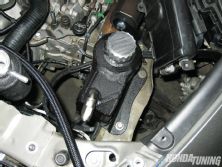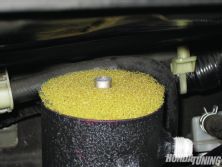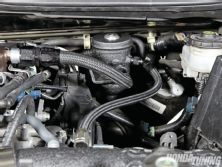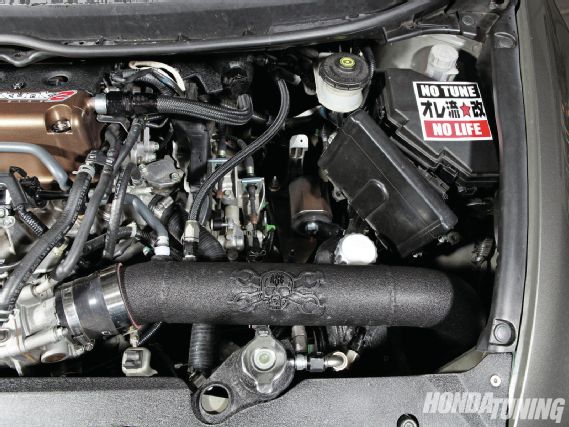 | Project Honda Civic Si Part 2: Custom Fabrication
| Project Honda Civic Si Part 2: Custom Fabrication
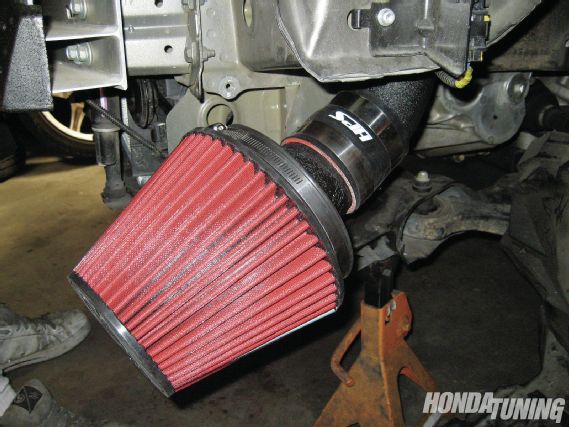 | Both are mated to the ASC custom piping with an HPS silicone coupler.
| Both are mated to the ASC custom piping with an HPS silicone coupler.
Due to the stock battery standing directly in the path of a long tube, cold-air intake, most systems use a 90-degree bend right off of the throttle body to snake behind the battery and to the bottom of the driver’s side headlight. Relocating the battery seemed like the best way to get the straightest route possible, while eliminating some bends. I contacted Dana Czech of ASC - Speed Metal and explained the situation. He was, as usual, way ahead of me as ASC had already designed a cold-air intake for another customer’s Si coupe a few months prior. ASC designed a custom battery cage that fits the OEM Civic battery, but drops it down to the lower core support, next to the frame rail. This gives you plenty of clearance for basically whatever size piping you can fit through the hole that resides right behind the driver’s side headlight. For my setup, I chose 3-inch piping and contacted Gil Salazar of Circuit Hero for one of his slick, billet-aluminum velocity stacks. Gil suggested I use a Blox Racing 6-inch-diameter air filter with his stack, as it matches up perfectly. Blox offers a number of filters for various applications, including universal, like mine. Unlike the oil-caked filters of the past, Blox filters use a dry element, which means no oil will be sucked into the intake, and maintenance is a breeze.
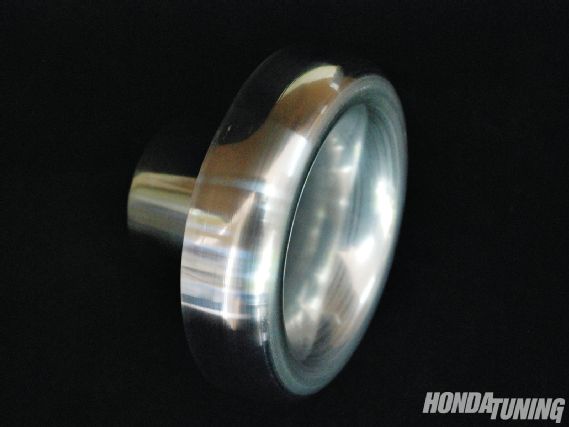 |
A Blox Racing 6-inch-diameter, dry element air filter is the perfect fit with Circuit Hero's velocity stack.
|
A Blox Racing 6-inch-diameter, dry element air filter is the perfect fit with Circuit Hero's velocity stack.
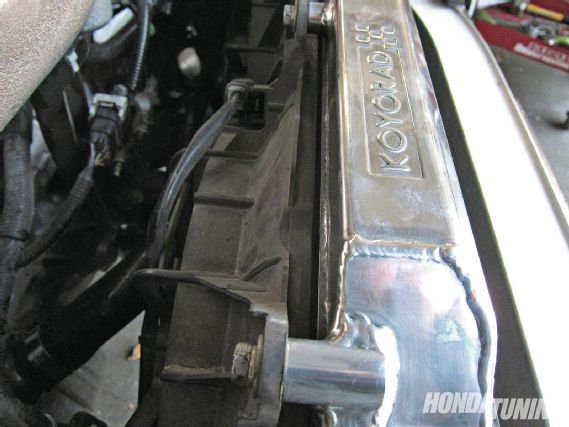 | Absolutely no modification is needed, and cooling efficiency is improved substantially over the factory radiator.
| Absolutely no modification is needed, and cooling efficiency is improved substantially over the factory radiator.
In order to give ASC a little more space to work with, I picked up a set of HPS Performance Silicone Hoses’ eighth-gen kits, and a few couplers to attach the filter/velocity stack combo to the new piping. The HPS hose kit is pure genius, in that it includes a reroute hose, which allows for larger intake piping without worrying about rubbing on the upper radiator hose. High-grade silicone reinforced with polyester means they won’t collapse, even under extreme temps. And speaking of temps, Sportcar Motion took a few moments to install a brand-new Koyo radiator while under the hood. Koyo offers a direct replacement for the 2006+ Civic built with aircraft-quality aluminum, Heliarc welded with Nocolok-brazed cores, and provides 20–30 percent more cooling than the OEM version. No mods are needed at all, and you can even use your stock fans and mounts because the fit is identical to stock.
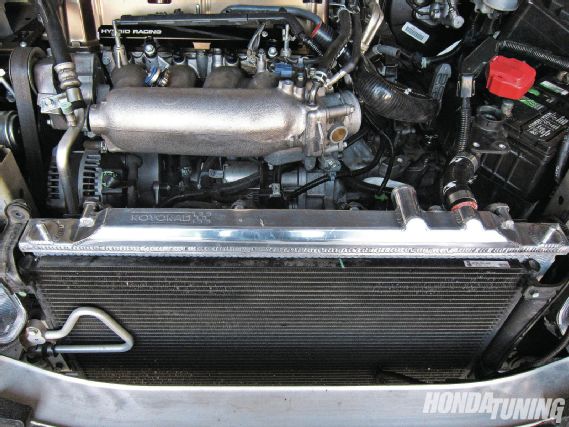 |
Koyo provided one of its high-quality aluminum radiators for the Si project.
|
Koyo provided one of its high-quality aluminum radiators for the Si project.
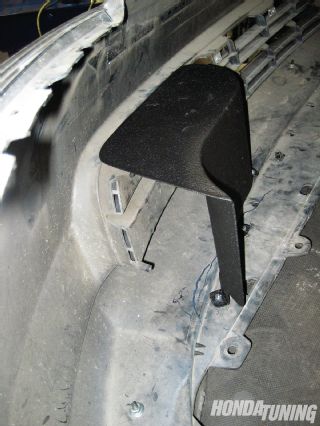 | Project Honda Civic Si Part 2: Custom Fabrication
| Project Honda Civic Si Part 2: Custom Fabrication
As I mentioned in another installment, the Si sedan has a “closed off” front bumper with no direct airflow to the filter. In order to get around this, Dana designed an aluminum air diverter that sits toward the middle of the front grille, and directs air from the front of the car right to the filter. Unless you shine a flashlight on the grille, or pull the front bumper off, you’ll never actually see it. The factory radiator fill neck is plastic, connected to the radiator by a thin rubber hose. HPS’s high-grade silicone hose replaces the factory piece, and ASC fabbed up a new fill neck and tank that actually sits a little higher than the factory version for improved cooling. Just behind that is an overflow tank and catch can with AN fittings and black braided lines that help evacuate oil buildup, and it all uses factory mounting points. To vent the valve cover and the intake, a breather tank that contains two different filter elements sits at the rear of the engine bay, again using factory-mounting points. Tossing out the plastic radiator cowl, Dana hand-formed an aluminum replacement with sharp bends and a cutaway for the filler neck. The look is light-years cleaner than stock, and it’s the very first thing people notice when the hood is popped.
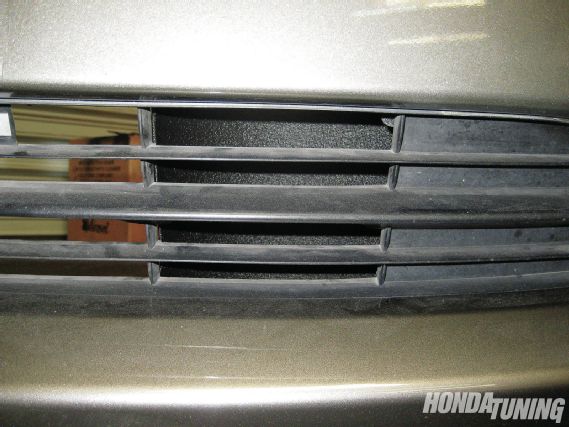 |
To get fresh air to air filter, ASC's Dana Czech designed a panel that hides in the front grille and redirects incoming air toward the intake.
|
To get fresh air to air filter, ASC's Dana Czech designed a panel that hides in the front grille and redirects incoming air toward the intake.
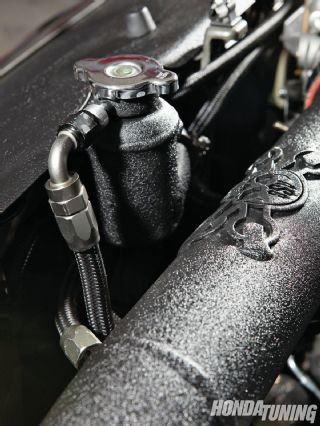 | Replacing the stock plastic fill neck is this custom ASC tank that actually sits higher than OEM for better cooling, and uses an AN fitting.
| Replacing the stock plastic fill neck is this custom ASC tank that actually sits higher than OEM for better cooling, and uses an AN fitting.
ASC’s work is just as it has always been—precise and downright clever. No cutting or heavy modifications are done to the car, and almost every single nut and bolt fits into an OEM hole, rather than making Swiss cheese out of the engine bay to force things to fit.
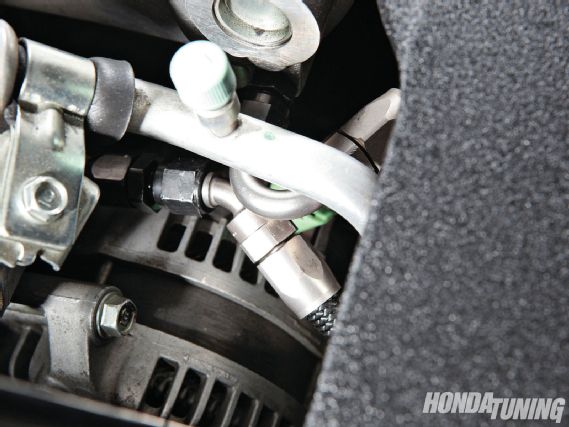 |
AN fittings and braided lines that snake from the passenger side of the intake manifold under the front cowl (out of sight), and to a custom tank.
|
AN fittings and braided lines that snake from the passenger side of the intake manifold under the front cowl (out of sight), and to a custom tank.
After fabrication and final mock-up, all of the ASC parts, along with a Circuit Hero coil pack cover, were sent to Chris of Powder1 for a fresh coat of wrinkle black powdercoat. Chris was able to get everything stripped down, coated, and ready for delivery virtually overnight, and the finished product appears factory fresh.
 |
An HPS silicone hose keeps everything together.
|
An HPS silicone hose keeps everything together.
The overall look under the hood is understated and fully functional. Unless you really know what you’re looking for, most would miss out on the fine details completely—perfect for a street car.

